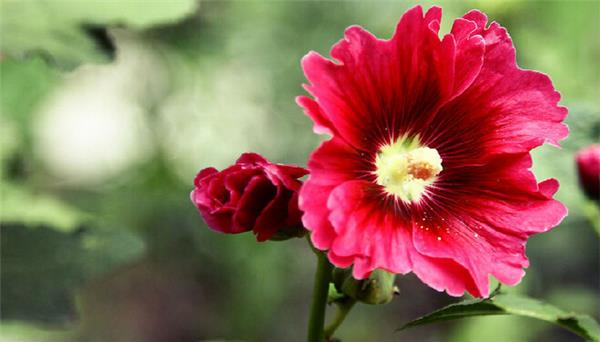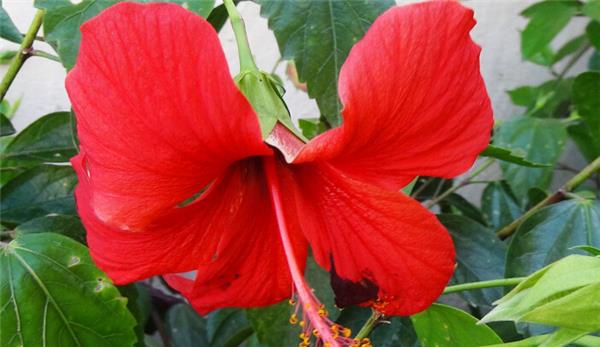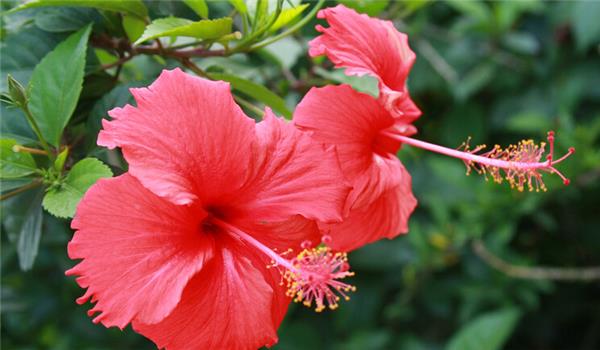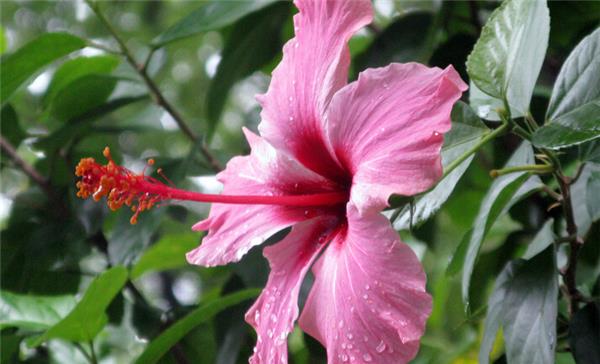A large collection of information on culture and breeding methods of Fusang
The Fusang flower is commonly known as the big safflower, which is usually planted in the courtyard and can be seen occasionally by the roadside. Fusang flowers bloom all the year round, which is very good-looking, so what is the breeding method of Fusang flower?

Six techniques of Fusang Culture
Fusang flower is a large evergreen shrub of Malvaceae, alias hibiscus, red flower, hibiscus peony, demon flower, etc., usually rose red, flowering year-round, summer and autumn is the most popular, many people will plant mulberry flowers in the courtyard, in the mulberry flower culture methods should pay attention to the following points:
Culture methods of Fusang: 1. Soil
It can adapt to all kinds of soil, but the fertile and loose slightly acidic soil is the best.
The culture method of Fusang: 2. Temperature
The suitable temperature for the growth of Fusang was 15-25 ℃ and 13-18 ℃ from October to March of the following year. The winter temperature should not be lower than 5 ℃, otherwise the leaves turn yellow and fall off. It is easy to suffer frost damage when the temperature is lower than 0 ℃, but it can still grow normally at high temperature above 30 ℃.
The culture method of Fusang: 3. Sunshine
Fusang is a strong positive plant, the growing period needs sufficient light in order to grow and bloom normally. If the light is insufficient, the bud is easy to fall off, the flower is small and the color is dim, but when the sun is too strong, the plant will burn, so it should be protected by shade properly.

The culture method of Fusang: 4. Moisture
During the growing period, the basin soil remains moist, and the stems and leaves grow rapidly, such as insufficient water supply, the leaves are easy to wilt, turn yellow and fall off. Usually watering depends on the situation of dry and wet, avoid too dry and too wet. Water should be watered in the morning and evening in midsummer and in the afternoon in spring and autumn. due to the low temperature in winter, the amount of watering should be strictly controlled, otherwise, the plant is prone to freezing injury. In addition, you should spray water frequently during the growing period.
The culture method of Fusang: 5. Fertilizer
After spring, mulberry enters the peak growing season, and fertilization should be strengthened in order to propagate the flowers, and the dilute liquid fertilizer dominated by phosphorus and potassium should be applied once a week. Do not apply thick fertilizer at flowering stage and cannot be fertilized during dormant period.
Culture methods of Fusang: 6. Pest treatment
Fusang is a kind of plant that often has insect pests, the main insect pests are aphids, chaff, cotton blowing and mites (commonly known as red spiders). These pests are all piercing pests, which can be diluted with aphid mites, aphid mites, mites and other drugs, and then killed by foliar spray, once a week, generally 2-3 times can be basically extinct. Bran medium and cotton blowing medium can harm leaves and epidermis. Generally, imidacloprid drugs or their modifiers can be used to dilute a certain number of times, and then spray to kill the affected parts. The harm is serious, but once every 10 days, 3 times can be basically extinct.

Cuttings and grafting are often used to propagate. Cuttings can be carried out except in winter, but the survival rate is high in the rainy season. The best cuttings are one-and-a-half lignified cuttings, 10 cm long, leaving top leaves, cut flat, inserted in sand bed, and rooting about 3 weeks after insertion.
1. Cuttage propagation: from May to October, the survival rate is the highest in the rainy season. It takes place in the greenhouse in winter. The best cuttings are semi-quality cuttings, which are 10 meters long, cut off the lower leaves, leave the top leaves, cut flat, insert in the sand bed, maintain high air humidity, room temperature is 18: 21 ℃, and rooting 20-25 days after insertion. The rooting period can be shortened by treating the base of cuttings with 0.3% 0.4% indolebutyric acid for 1-2 seconds. Transplant into pot when the root is 3 to 4 meters long.
2. Grafting propagation: in spring and autumn. It is mainly used for mulberry varieties with difficult or slow rooting, especially for double-petal varieties with low survival rate. With branch grafting or bud grafting, rootstock with a single valve to support mulberry. The grafted seedlings branch and blossom in the same year.

Fusang flower is a very common plant, which usually blossoms the most in summer. it looks fiery and red in the distance, which is very energetic. Many people will focus on places such as courtyards or balconies. We should remember the skills taught in breeding methods. I'm sure you can grow healthy mulberry flowers.
- Prev

Describe in detail the breeding methods and common problems of Begonia angustifolia
Describe in detail the breeding methods and common problems of Begonia angustifolia
- Next

Is hyacinth poisonous and what are the breeding methods of hyacinth?
Is hyacinth poisonous and what are the breeding methods of hyacinth?
Related
- Wuhan Hospital Iron Tree Blooming Result Was Instantly Frightened by the Gardener Master
- Which variety of camellia is the most fragrant and best? Which one do you like best?
- What is the small blue coat, the breeding methods and matters needing attention of the succulent plant
- Dormancy time and maintenance management of succulent plants during dormancy
- Minas succulent how to raise, Minas succulent plant pictures
- What are the varieties of winter succulent plants
- How to raise succulent plants in twelve rolls? let's take a look at some experience of breeding twelve rolls.
- Attention should be paid to water control for succulent plants during dormant period (winter and summer)
- Watering experience of twelve rolls of succulent plants
- Techniques for fertilizing succulent plants. An article will let you know how to fertilize succulent plants.

